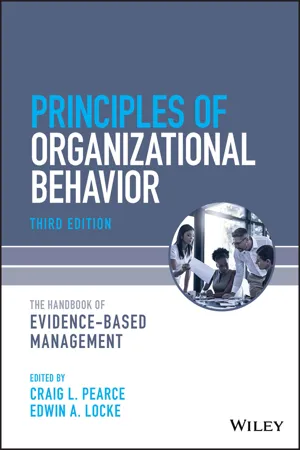
Principles of Organizational Behavior
The Handbook of Evidence-Based Management
- English
- ePUB (mobile friendly)
- Available on iOS & Android
Principles of Organizational Behavior
The Handbook of Evidence-Based Management
About this book
Explore invaluable management advice informed by the latest in organizational and industrial behaviour research
In the newly revised Third Edition of Handbook of Principles of Organizational Behavior: Indispensable Knowledge for Evidence-Based Management, world-renowned organizational behaviourists Edwin A. Locke and Craig L. Pearce deliver a comprehensive and authoritative discussion of sound management practices informed by the most recent evidence and research in organizational and industrial psychology.
In the book, the authors present:
- Complimentary and downloadable video material linked to each chapter
- Executive interviews and author interviews, new cases, assessments, inventories and exercises
- Updated chapters written by world-leading experts on the covered topics
An indispensable resource for students of human resources, organizational behaviour, industrial psychology, public administration and related subjects, Handbook of Principles of Organizational Behavior will assist students and professionals seeking the latest evidence-based management guidance.
Frequently asked questions
- Essential is ideal for learners and professionals who enjoy exploring a wide range of subjects. Access the Essential Library with 800,000+ trusted titles and best-sellers across business, personal growth, and the humanities. Includes unlimited reading time and Standard Read Aloud voice.
- Complete: Perfect for advanced learners and researchers needing full, unrestricted access. Unlock 1.4M+ books across hundreds of subjects, including academic and specialized titles. The Complete Plan also includes advanced features like Premium Read Aloud and Research Assistant.
Please note we cannot support devices running on iOS 13 and Android 7 or earlier. Learn more about using the app.
Information
Table of contents
- Cover
- Title Page
- Copyright
- Preface
- Acknowledgments
- Introduction
- 1 Select on Intelligence
- 2 Select On Conscientiousness and Emotional Stability
- 3 Structure Interviews to Recruit and Hire the Best People
- 4 Attain Emotional Control by Understanding What Emotions Are
- 5 Motivate Employee Performance Through Goal Setting
- 6 Cultivate Self-Efficacy for Personal and Organizational Effectiveness
- 7 Pay for Performance
- 8 Promote Job Satisfaction Through Mental Challenge
- 9 Follow the Science to Make Training Work
- 10 Embed Performance Appraisals into Broader Performance or Management Systems
- 11 Use Participation to Share Information and Distribute Knowledge
- 12 Recognizing Employees
- 13 Sustain Organizational Performance Through Continuous Learning, Change, and Realignment
- 14 Empowerment's Pivotal Role in Enhancing Effective Self‐ and Shared Leadership
- 15 Effective Use of Power and Influence Tactics in Organizations
- 16 Engage in Visionary Leadership
- 17 Foster Trust Through Ability, Benevolence, and Integrity
- 18 Teamwork in Organizations
- 19 Compose Teams to Ensure Successful External Activity
- 20 Manage Intrateam Conflict Through Collaboration
- 21 Clarity, Conciseness, and Consistency Are the Keys to Effective Communication
- 22 Stimulate Creativity by Fueling Passion
- 23 Manage Stress at Work Through Preventive and Proactive Coping
- 24 Conflict Resolution Through Negotiation and Mediation
- 25 Achieve Entrepreneurial Growth Through Swiftness and Experimentation
- 26 Achieve Work-Family Balance Through Individual and Organizational Strategies
- 27 Use Advanced Information Technology to Transform Organizations
- 28 Make Management Practice Fit National Cultures and the Global Culture
- 29 Strategy and Structure for Effectiveness
- Index
- End User License Agreement